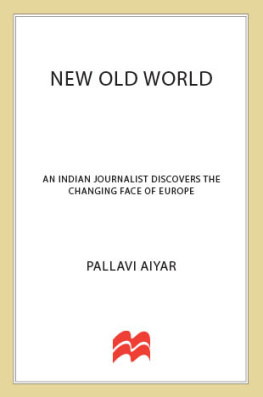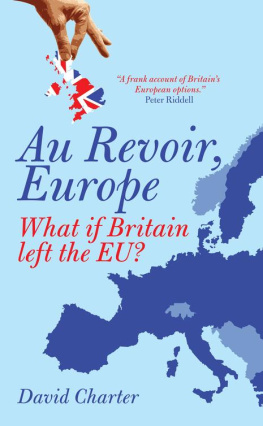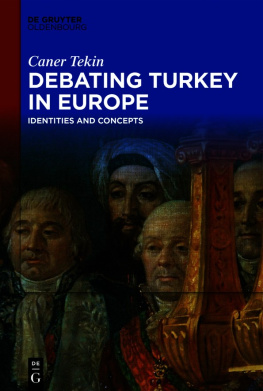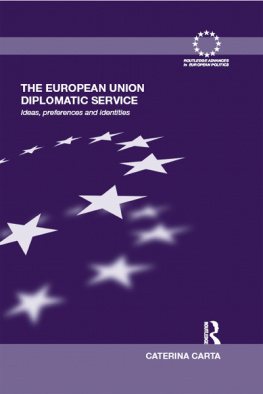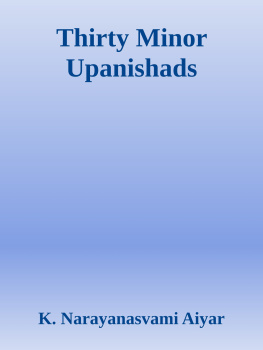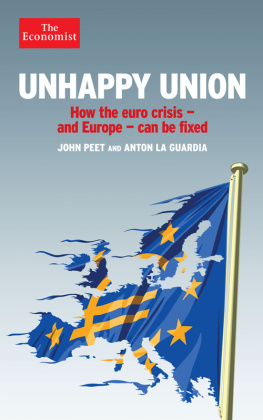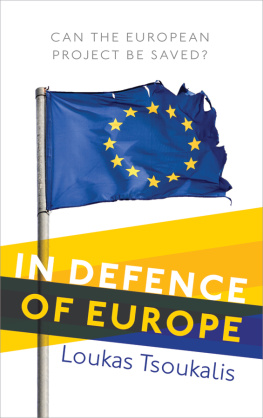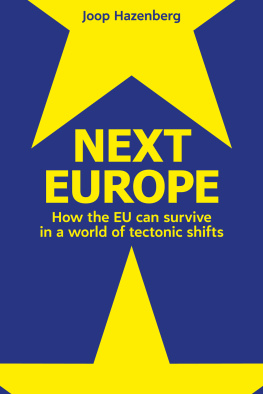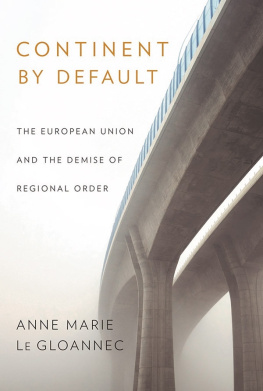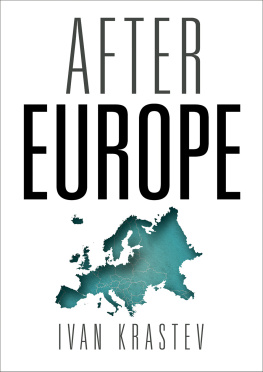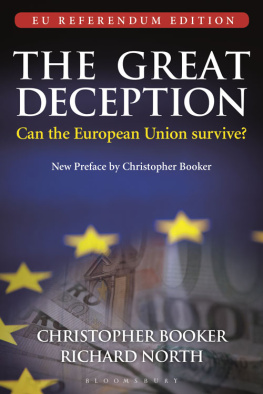New Old World
An Indian Journalist Discovers the Changing Face of Europe
Pallavi Aiyar

St. Martins Press
New York
Thank you for buying this St. Martins Press ebook.
To receive special offers, bonus content, and info on new releases and other great reads, sign up for our newsletters.

Or visit us online at us.macmillan.com/newslettersignup
For email updates on the author, click here.
The author and publisher have provided this e-book to you for your personal use only. You may not make this e-book publicly available in any way. Copyright infringement is against the law. If you believe the copy of this e-book you are reading infringes on the authors copyright, please notify the publisher at: us.macmillanusa.com/piracy .
For
My Father, Swaminathan
It has been about five years since the terms Europe and crisis came to be yoked, largely as the result of the financial troubles of governments and banks in several countries of the eurozone. Since then, the strenuous efforts of the European Central Bank have averted some of the more catastrophic potential consequences. The European Union has survived with its corporeal integrity intact, as has the euro itself. And yet, the crisiswhich, as this book explains, is in fact the concatenation of several crisescontinues to eat away at Europes confidence, coherence and competitiveness.
This book focuses on the period 20092012, the years that I lived in Brussels as the sole Indian journalist reporting on the European Union. Yet the themes addressed are increasingly relevant. Demography and diversity, immigration and Islam, globalization and the rise of Asia remain a set of formidable challenges for Europe.
Economic growth is still stagnant, with even Germany, the regions export-oriented manufacturing powerhouse, sharply slowing. Unemployment is at record highs; measures to bring fiscal coherence to the eurozone are incomplete; and the willingness of national democracies to heed the supranational, austerity-enforcing diktats of the European Union is reaching its limits.
Across Europe, euro-skepticism is on the ascent. The election of left-wing, anti-austerity party Syriza in Greece is only one case in point. In European parliamentary elections in 2014, anti-EU parties made substantial gains, including victories in Britain and France. National elections in Sweden saw the far-right Sweden Democrats take almost 13 percent of the vote to become the third-largest party in the country, while in Germany the anti-euro party Alternative for Germany has made inroads in regional elections.
An aging population and low birth rates in many European countries present a thorny demographic conundrum. And yet, immigration, both up and down the value chain, is resented. Most of the newly ascendant anti-EU parties, both right and left, are also stridently anti-immigrant. As Europes cities become increasingly multicultural, the region is struggling to adapt to its new diversity.
Many of Western Europes more recent citizens are ethnically different from, and religiously at odds with, the established majority in their adopted countries. The assumed divergence of their value system from the mainstream is provoking anxieties about what it means to be European today, concerns that are exacerbated by Islamist terrorism. The murder of 11 people in connection with an attack on the cartoonists of French satirical magazine Charlie Hebdo in January 2015 spotlighted these tensions.
Europes crises are unspooling against the backdrop of a broad shift in economic power toward Asia, a long-term trend that has been accelerated by the financial troubles of many eurozone countries. It is increasingly evident that, for the old world, there is scant choice but to prepare for a new normal.
Pallavi Aiyar
January 2015
Jakarta
I moved to Brussels, the Belgian capital and headquarters of the European Union, in the spring of 2009. My husband, Julio, a Spaniard, had recently passed a series of examinations to qualify as a European Commission official, so the city would be our home for much of the future. Having lived in China for the better part of the decade, it promised to be quite a disjunctive change of scene.
Leaving Beijing had not been easy. My last few days in China were spent in a haze of nostalgia for what I would be leaving behind. An elderly man painting ephemeral calligraphy with brush and water on the walkway of a park, the clatter of an intense game of mah-jongg, the balletic swirling of steam rising from a cup of jasmine tea: every image, scent and sound took on emotional significance as I mourned their inevitable fading into wisps of memory.
But this didnt preclude a simultaneous state of anticipation. Seven years was a long time to spend anywhere, and in some ways I felt Id had my bellyful of China. My work as a newspaper reporter had taken me to almost every province of the vast country. Id learned the language, made friends and had a baby during this period. And to wrap it all up in perfect foreign-correspondent style, Id even written a book about it all.
A new kind of life awaited in Brussels. I was aware that the Belgian capital was not renowned for excitement, but it did promise a certain European charm: waffles and good coffee, cobblestones and cafs. I imagined it was the antithesis of China. The calm to Beijings chaos, the Belgian yin to the Chinese yang.
It would be a move from the contradictions and messiness of a giant country hauling its toiling millions out of poverty to a settled, prosperous land of manicured parks and handsome fin de sicle homes. After years of being fed indigestible bits of sea slugs in remote towns in deepest Shandong, it was undeniably seductive to imagine a new diet of pralines and freshly baked baguettes.
What I would be exchanging in return for baguettes and pralines, however, was the story of the twenty-first century: the rise of China. For years Id had front-row seats to the volcanic awakening of this Asian colossus, the consequences of which were leading to an epochal inversion of world power.
The China story had an elemental force to it. Having lived in Beijing in the years between the citys winning the bid to host the 2008 Olympic Games and the event itself, I had been witness to the visceral energy that was so characteristic of the country. In a paroxysm of growth, the city virtually vomited up entire new neighborhoods in what sometimes felt like weeks.
Chinas ambitions and newly resurgent position in the world were symbolized most often by superlatives relating to size: the worlds biggest dam, the largest airport and museum, the longest sea bridge, the highest railway line, the most enormous IKEA store outside of Sweden itselfthe list was long, with new records being added with unfailing regularity.
Chinas ascendancy was not limited to shiny new physical infrastructure either. Indicating one of the more startling shifts in global power relations, Beijing had also emerged as the globes chief creditor, accumulating the worlds largest foreign currency reserves and financing the spending sprees of the West, in particular, the United States.
And China was only part of the new, twenty-first century story. While Beijing might have been the showiest example among the emerging economies, my own country, India, had also transformed her hitherto lumbering economic gait to a veritable canter, achieving growth rates of 8 percent in some years.
International Monetary Fund figures help to put this re-orientalization of the world in perspective. Between 1960 and 1985, advanced economies on average accounted for about three-quarters of the global gross domestic product (GDP). By 20089, this figure was down to 57 percent. In contrast, the share of emerging markets had risen from just about 17 percent in the 1960s to close to 40 percent by 20089.
Next page
